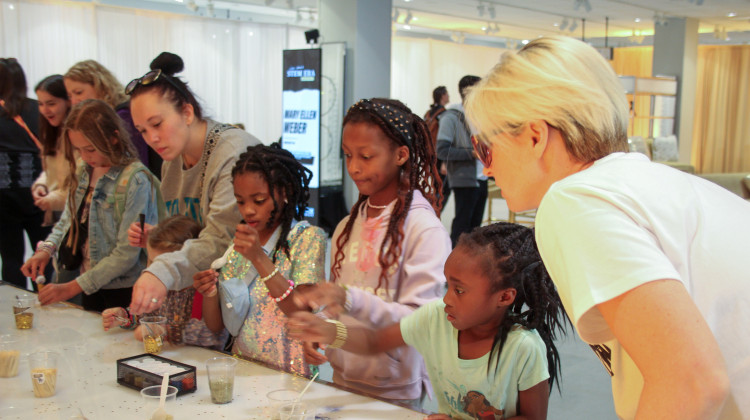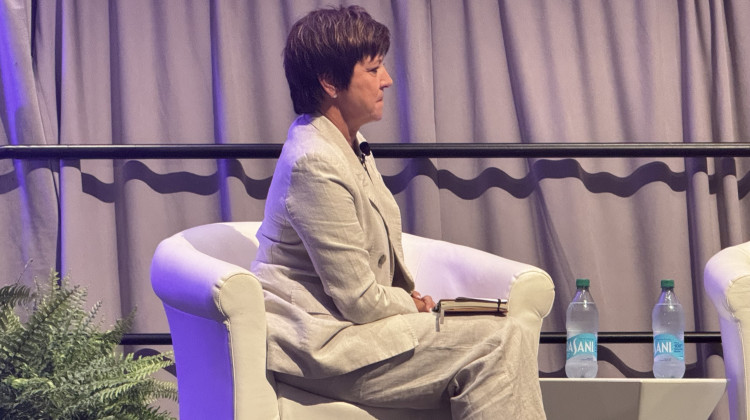A century old warehouse in Indy’s Martindale-Brightwood neighborhood is primed for new life as an anchor for the next generation of food businesses.
The Tinker Flats building has been standing at the vacant at the corner of 16th Street and the Monon for nearly 20 years. The hulking warehouse was once an office furniture factory and later a recycling center and will soon be the home of local food and beverage businesses looking to get started.
Gerry A. Hayes, principal of Slane Capital, and the man driving the effort says they’re reworking an idea more often associated with computers than chocolate.
"On the digital side you have all these incubators that are helping folks build apps, and consumer facing web properties, but there really isn't a whole lot of resources or collaborations around businesses that want to build around food and beverage," explains Hayes.
One of the businesses committed to moving in is Trade Secret Chocolates. Owner Matt Rubin says he started making chocolate for his wife.
"I found out last June that my wife has a milk alergy," says Rubin. "As I was throwing the chocolate away in our house she broke down and I said 'I'm going to try and make chocolate from scratch."
Rubin had no experience making chocolate but soon discovered the craft involves a lot of science, something he’s familiar with.
"I have a background in biology and chemistry and I have cooked for many years," explains Rubin. "Chocolate is somewhere between food and science and this is something I decided I want to get good at."
He started working out of Indy’s Kitchen, a local commercial space that many food trucks use, but quickly started to experience growing pains.
"It's a great place to develop a product, but you're also fighting for space," says Rubin. "We actually had to design a new process and shrink everything down into a few square feet."
Rubin is going to have a lot more elbow room at Tinker Flats. He’s also going to have a lot more technical help. Hayes says his company plans to help artisan startups by providing resources like staff food scientists and quality assurance experts.
"In many instances you can't get your product out into the marketplace with large retailers unless you've received the right certification," says Hayes. "It's very expensive to do and most startups can't afford to put that kind of staff on early in the game so we provide our staff to help with that process."
Rubin says it also feels like a perfect fit.
"This is what you would expect if you were going to an old artisan, you go to France and you see someone who has been baking bread in the same building for 200 years," says Rubin.
Three other food and beverage related businesses including a marketing group, a brew incubator and an artisan distiller, are already committed to moving into the building. Slane Capital will also move into the space, where renovation is set to begin next month.
Hayes hopes the food innovation space can help spark the revitalization of Martindale-Brightwood.
"There's a social component to what we're doing," says Hayes. "There are plenty of opportunities to repurpose existing structures for distribution and manufacturing and to open up new structures and there's a lot of jobs that could be created for the neighbors of Martindale-Brightwood."
The Martindale-Brightwood area thrived in the railroad era but by the mid 1940s all the railroad business was gone and the neighborhood fell on hard times.
In 2011 the 16th St Strategic Redevelopment Plan identified the building as priority development site. The plan says that any development must contribute to the character of the neighborhood and enliven corridor that used to be known as Tinker St.
Hayes believes that Tinker Flats will help the neighborhood grow along with the demand for local food and drink.
"Particularly with the millennials," says Hayes. "They want to try new things, they want to experiment and I think that's here to stay because you can wrap an experience into your food."
The hub won’t be open to the public for retail but Rubin says it may provide opportunity to teach people who are passionate about food.
"People learn how to work with food," says Rubin. "They get trained on the basics. I like it because it's a process where you can really train someone into a new profession."
The project comes with a $3- to $3.5-million price tag and the City of Indianapolis is supporting the build with $1 million from a Community Development Block Grant.
Hayes hopes the building will operational late this year.
 DONATE
DONATE







 View More Articles
View More Articles


 Support WFYI. We can't do it without you.
Support WFYI. We can't do it without you.